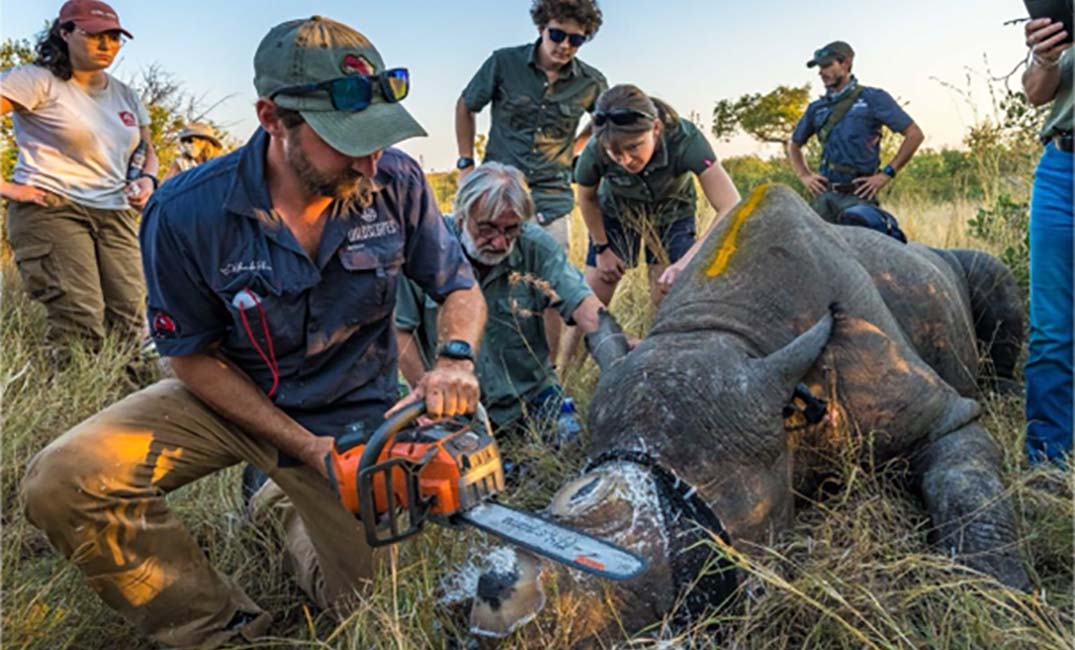A landmark international study published yesterday (5 June 2025) in the Science Journal reveals that dehorning rhinos significantly reduces the risk of poaching – one of these iconic species’ most immediate threats.
The research, co-led by the University of Cape Town (UCT), focused on 11 reserves in South Africa’s Greater Kruger region from 2017 to 2023 – a critical conservation area that is home to approximately 25% of Africa’s remaining rhino population.
The study was the result of a powerful collaboration between reserve managers, represented by the Greater Kruger Environmental Protection Foundation (GKEPF), and scientists from UCT’s Centre for Statistics in Ecology, Environment and Conservation, Nelson Mandela University, Stellenbosch University and the University of Oxford. Key partners who supported the study include the South African National Parks, the World Wildlife Fund South Africa and the Rhino Recovery Fund.
“We documented the poaching of 1 985 rhinos (about 6,5% of the population annually) across 11 Greater Kruger reserves over seven years. This landscape is a critical global stronghold that conserves around 25% of all Africa’s rhinos,” says Dr Tim Kuiper, lead author, who conducted the work as a postdoctoral researcher at UCT and is now a senior lecturer at Nelson Mandela University.
“Dehorning rhinos to reduce incentives for poaching (2 284 rhinos were dehorned across eight reserves) was found to achieve a 78% reduction in poaching using just 1.2% of the overall rhino protection budget,” he adds.
Using a comparative approach between dehorned and horned rhino populations and tracking changes over time, the study shows that dehorning is a highly cost-effective intervention – though not without challenges.
Some poaching for horn stumps and regrowth continued, and evidence from 2024–2025 indicates this remains a growing concern. The potential displacement of poaching to horned populations elsewhere also remains a critical consideration.
Between 2017 and 2021, the reserves invested approximately $74-million (R1-billion) in anti-poaching strategies – including ranger patrols, tracking dogs, helicopters and surveillance technology. Despite this massive investment, the study found no statistically significant evidence that these traditional law enforcement measures alone reduced poaching.
“Finally, ineffective criminal justice systems mean that arrested offenders often escape punishment, with evidence from our study area of multiple repeat offenders,” says Dr Kuiper.
This study stands out not only for its findings but also for its model of science-policy collaboration. The research was sparked by GKEPF reserve managers themselves, who sought to evaluate the effectiveness of their anti-poaching investments.
“The true value of this innovative study, conceived by GKEPF operational managers, lies in its collective critical thinking. Ensuring not only that operations are guided by science, but also that science is grounded in real experience from the frontline,” says Sharon Hausmann, CEO of GKEPF.
Dr Markus Hofmeyr of the Rhino Recovery Fund says: “From a donor perspective this study has given excellent insight where conservation donor funding can be spent and where to avoid funding.”
Professor Dame EJ Milner-Gulland of the University of Oxford comments: “This collaboration is a brilliant example of how the effectiveness of conservation interventions can be assessed quantitatively, even in challenging and complex situations, and how important the participation of on-the-ground practitioners is in initiating, and interpreting, such research.”
“It’s important to check that our conservation interventions work as intended, and keep working that way. For me, this project has again highlighted the value of collecting detailed data, both on the interventions that were applied and the outcome. It’s such data that makes robust quantitative analyses possible,” says UCT Professor Res Altwegg, who supervised the statistical analysis.
The findings open a timely window for governments, funders, conservation NGOs and the private sector to rethink and recalibrate strategies in addressing wildlife crime, particularly rhino poaching, with a renewed focus on data-driven and cost-effective interventions.

